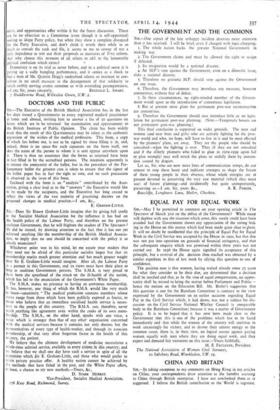THE GOVERNMENT AND THE COMMONS
Sin,—One aspect of the late unhappy incident deserves more attention than it has received. I will be brief, even if charged with logic-chopping. r. The whole nation backs the present National Government in making war.
2. The Government claims and must be allowed the right to resign if defeated.
3. Its resignation would be a national disaster.
4. An M.P.'s vote against the Government, even on a dOmestic issue, risks a national disaster.
5. Therefore no patriotic M.P. should vote against the Government on any issue.
6. Therefore, the Government may introduce any measure, however contentious, without fear of defeat.
7. In these circumstances, no right-minded member of the Govern- ment would agree to the introduction of contentious legislation.
8. But at present -most plans for permanent post-war reconstruction are contenfous.
9. Therefore the Government should now introduce little or no legis- lation for permanent post-war planning. (Note.—Temporary houses are not permanent post-war planning.) This final conclusion is supported on wider grounds. The men and women (and near boys and girls) who are actively fighting for the Post- war world and who, we hope, will have to live in it and be most affected by the planners' plans, are away. They are the people who should be consulted—witen the fighting is over. They (if they are not consulted and if the elderly planners who failed to plan in 1919-1939 again fail or plan wrongly) may well wreck the plans or stultify them by inatten- tion caused by disgust.
Let us, Sir, who are now mere lines of communication troops, do our utmost to stop these hasty and indecent attempts to shape the future of these young people in their absence, whose whole energies are at present devoted to preserving the very raw material (which they must use) of future p!anning—and incidentally but quite unimportantly,


























 Previous page
Previous page